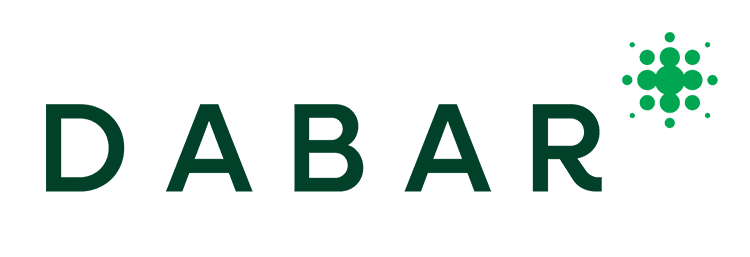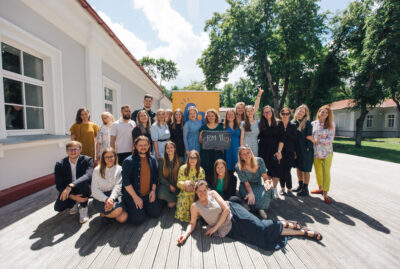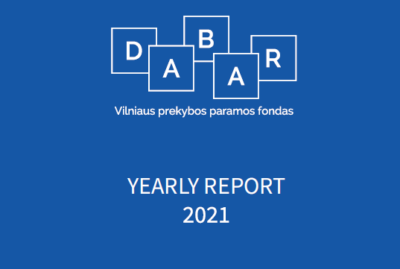
Two years ago, Rumšiškės’ Antano Baranausko Gymnasium undertook a new challenge to carry out a change project that would enable the school to introduce effective models for monitoring and analyzing students’ personal progress, as well as discover new ways of providing students with the individual support they need.
“We have always emphasized that learning success and results largely depend on the purposeful engagement of students in the process of education and their ability to set their own learning goals with the help of the pedagogues, follow their own progress, and identify the difficulties that arise. Therefore, we sought to improve in these areas and set an example to other educational institutions, first by implementing ‘Lyderių laikas 3’ [Time for Leaders 3] project, and then by undertaking a change project under ‘Renkuosi mokyti!’ [I Choose Teaching!] program,” tells A. Čepulis, the director of the gymnasium.
According to him, it is crucial that students see themselves not as passive recipients of information but as independent participants of the educational system who are able to clearly envision and accordingly direct their learning paths. In other words, A. Čepulis believes that studying should be a purposeful movement toward a goal and not a passive floating downstream. Certainly, the support of the pedagogues and the entire school community is critical in this process.
“To achieve changes in this area, new skills must first be acquired by the pedagogues. Teachers must go beyond grading student performance and take in the larger picture – the overall learning progress of each child, the problems and obstacles they encounter, the areas they need to work on more, as well as the most effective learning methods in each individual case. This is certainly an immense task succeeding at which may often first require changes in the attitudes, outdated methods and practices of the teachers themselves. Moreover, the pursuit of this goal must involve teachers of different subjects, class teachers, psychologists, and the entire school community,” says A. Čepulis.
More attention to the success of each student
Rumšiškės’ Antano Baranausko Gymnasium, together with the team of researchers and consultants of “Renkuosi mokyti!”, began introducing new methods at school which help assessing the progress made by students and provide them the support they need, as well as encourage them to become more actively involved in setting and achieving their learning goals.
“First of all, we had internal analyses and discussions in the gymnasium, and exchanged experiences that would enable our educational institution to focus more on monitoring and encouraging the personal progress of each student. We reached an agreement within the school community regarding the classes to be monitored and the monitoring and benchmarking tools we would use. We also prepared a project in which we clearly defined the functions of all the participants of the process. This served as a certain foundation for monitoring of each student’s progress and providing individual support,” says the principal of the gymnasium.
During the implementation of the change project, the gymnasium has also introduced a student tutoring system, which enables students to receive individual recommendations that help setting and achieving own learning goals. In addition, each class organizes roundtable meetings several times a year, during which various aspects of each student’s performance are evaluated and relevant recommendations are given.
“In case of any of these instruments, the focus is on the success and opportunities of each student in seeking better learning outcomes and solving arising issues. Indeed, from the moment we started implementing these changes, we have noticed a positive change in the students’ attitude toward studying, while the overall student performance results have improved. At the same time, the teachers started focusing more on the needs and achievements of each individual student as well,” rejoices A. Čepulis in the changes.
He notes that there were also plenty of challenges in seeking changes, the greatest of which was the COVID-19 pandemic and remote education. Despite these challenges, the students’ personal progress remains a priority and A. Čepulis is convinced that it has become even more important in distance learning.
“Although the necessity to organize the process of education remotely has somewhat disrupted our work and plans and we had to put more effort in reorienting ourselves to lessons in virtual space, we have certainly not abandoned our aims to consistently monitor and encourage the students’ personal progress. Distance learning has further highlighted the importance of these efforts, since the ability to seek goals independently has become particularly important when studying from home. However, we are all looking forward to returning to normalcy and resuming a full-scale implementation of the changes we started,” says A. Čepulis.
Turning a new page in the education system
The head of “Renkuosi mokyti!” program that seeks to bring changes into the education system, Agnė Motiejūnė, says that Rumšiškės’ Antano Baranausko Gymnasium’s goal to focus on the personal progress of each student is in line with the direction of a modern education system.
“Noticing every child and being attentive to their individual needs is particularly important if we want to create a non-discriminatory education system that offers equal opportunity. It is vital that the pedagogues and school administrations see the class not as a monolith but as a collection of individual students who come from different backgrounds, face their own difficulties and issues, and have different viewpoints and abilities. Without doubt this is not necessarily easy, which is why we, together with our partners, support schools in carrying out change projects,” says A. Motiejūnė.
Several dozens of Lithuanian schools have already implemented change projects sponsored by “Renkuosi mokyti!” program and funded by Vilniaus Prekyba Support Fund “Dabar”. Experts assigned by the program help identifying the most urgent problems and initiating changes that contribute to their solution.
“It is truly heartening that schools have eagerly started taking initiative in implementing changes and seek to create a better learning environment for different students, instead of just waiting for decisions from ministries or other institutions. That is of crucial importance because even small changes lead to bigger ones and, by implementing change projects and empowering teachers who are willing to drive changes, the educational institutions are together turning a new page in the Lithuanian education system,” says A. Motiejūnė.



